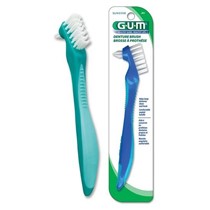Oral Health for Older Adults
I Care for an Older Adult
I care for an older adult. How should I look after his/her mouth?
Many older adults today still have most, if not all, of their own natural teeth. Some will have some natural teeth plus either a removable or fixed denture, and others will have no remaining natural teeth and have complete dentures. As people get older and have challenges caring for themselves, they may also struggle to care for their mouths.

ORAL HEALTH NEEDS OF OLDER ADULTS
Older adults are often at increased risk of dental disease, and thus it is important that care for their mouth be provided in the same way that it is for other essential parts of the body. Increased risk of dental disease comes about through changes in the quality and quantity of saliva, changes in diet, particularly an increase in sugar-containing foods and snacks, and difficulties in performing adequate oral hygiene due to loss of dexterity.
INCREASED RISK OF DENTAL DISEASE
Many older adults today still have most, if not all, of their own natural teeth. Some will have some natural teeth plus either a removable or fixed denture and implants, and others will have no remaining natural teeth and have complete dentures. As people get older and face challenges in caring for themselves, they may also struggle to care for their mouth. Preventing dental disease is even more important in this age-group as dental treatment is very difficult to carry out on elderly and medically-compromised patients.
If teeth are lost and chewing becomes more difficult, the risk of choking increases – a leading cause of death. If the mouth is not cleaned the risk of inhalational pneumonia also increases.
ORAL CARE
The care required can be divided into the daily care provided at home or in an institution, and the care provided professionally in the dental office.
DAILY CARE
Natural Teeth
If still with natural teeth, older people’s natural teeth will have served for many years and will exhibit wear, dental restorations, and possibly gum recession that may expose roots of the teeth. Wear, the effects of dentistry, and gum recession all contribute to challenges in keeping the mouth clean, fresh, and healthy. Mouths with natural teeth should be cleaned at least twice a day, morning and evening, with a good toothbrush and fluoride toothpaste, and between teeth cleaning should be carried out once per day with specially designed interdental brushes or flossers. Select a toothbrush that has a handle that enables a sturdy grip, a small to medium sized brush-head, and soft bristles. Performing oral hygiene for another person is not easy, but the same exact principles apply. Depending on the status of the person you are caring for, oral hygiene may have to be performed in a bed or in a chair. Good lighting assists in visualizing the process, and if a sink is not nearby, a small bowl will be needed.
Natural teeth and a partial denture
If a person has some natural teeth and either a fixed or removable denture, the challenges described above for those with natural teeth still exist, but a denture will add an additional challenge. If the denture is fixed with screws or cement, special techniques will be required to clean around and between other teeth and gums. On the other hand if the denture is removable, it can be taken from the mouth while the mouth is cleaned in the normal manner and brushed and soaked before it is reinserted.
No natural teeth and complete dentures
For a person with increased age, complete dentures can become a challenge as good bony ridges of gum tissue are needed to support them and hold them firmly in place. Older people also need saliva to give suction and good muscle control for eating and speaking without dislodging the dentures.
Cleaning dentures is very important.Dentures should be removed and brushed to clean away food debris and dental plaque. Soaking in a denture cleanser is an additional method of cleaning and can reach where a brush might not. While the dentures are out of the mouth, rinse the mouth to remove food debris. If a denture adhesive is used, make sure it is not stuck on the person’s gums or palate. A soft toothbrush may be used to gently cleanse the gums, palate and tongue to remove dental plaque and any remaining denture adhesive. Don’t forget, even denture wearers should have at least an annual check-up to evaluate the function and fit of the denture and to perform an oral cancer screening.


PROFESSIONAL CARE
Regular dental check-ups are important for everyone (even those with no teeth remaining), and the individual’s dentist will be able to advise how frequently these should occur based upon oral health and medical status. The dentist will be able to offer advice about the need for any additional fluoride treatments, and the dental hygienist will be able to demonstrate how best to address the individual’s oral hygiene needs and accomplish thorough plaque removal.
HERE’S WHAT TO DO:
As you start to provide care contact the individual’s dentist in the same way you contact all his/her other health care providers. If there is no dentist of record, ask one of the other health care providers to recommend a dental office that can easily accommodate the needs of older adults.
Ask the dentist and dental hygienist how frequently routine check-up appointments should be arranged and how you should best perform the necessary daily oral hygiene procedures.
In preparing for the dental visit have the following on hand:
A list of all prescription and over-the-counter medicines
A list of all medical conditions, including allergies
Dental insurance or Medicaid cards
Any dentures, even if they are not routinely worn
Brush the natural teeth at least twice a day with a good toothbrush and fluoride toothpaste. Change the brush often, at least once every three months. Rinse it clean after each use.
Use interdental brushes or flossers to clean between all teeth, where normal toothbrush bristles cannot reach. Interdental brushes should be replaced every 1-2 weeks.
Clean removable dentures at least once per day with a specially designed denture brush, and rinse to cleanse the mouth while the denture is out.
Avoid frequent sugary snacks as they increase the risk of dental decay (for natural teeth).
Cut food into small pieces to reduce the risk of choking, especially for denture wearers.


